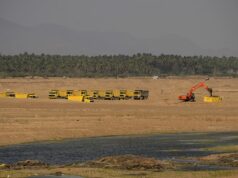The current issue of Outlook Business has a good piece by PT Sebastian on the Draft Food Security Bill. The piece highlights several of the major problems with the legislation and rightly assesses the draft bill’s weaknesses. However, it is too cautious in its proposed solutions.
The article lists several fundamental problems with the legislation – identification of the poor, opportunity for corruption, multi-layered and inefficient distribution systems, and illogical definitions of poverty – but still calls the draft bill a “big leap toward providing succour to the country’s poor.” It calls for an improved bill with greater responsibility on the part of the Centre so that India’s growing population is well fed. I have a different proposal.
The Draft Food Security Bill is all about identifying the poor, and presumably hungry, and efficiently distributing food to them. The aim there is clearly good. Who doesn’t want hungry people to have food? But what about the more fundamental question of why so many are so poor in the first place? Why do millions depend on the government to meet even their basic food needs? Feeding poor people is fine, but it doesn’t keep them from being hungry again tomorrow. Addressing the root causes can help us eliminate hunger altogether, rather than simply putting it off for a day.
The problem is poverty, and the opposite of poverty is wealth, so what we ought to be considering is how to promote wealth creation. How do we make it easier for poor people to earn a livelihood and support their families? How do we remove government barriers and dismantle the license raj so that more people can start micro-businesses? How do we make it easier for street vendors to trade legally and grow their businesses? How do we change the current system that prevents cycle rickshaw pullers from ever growing beyond a single cycle rickshaw? How do we change the regulatory environment so that bigger businesses can expand and employ more people? How do we ensure that the poor aren’t condemned to stay that way?
The Draft Food Security Bill proposes some good things, as the Outlook Business piece makes clear. It seeks to increase transparency and accountability, tries to make the public distribution system less susceptible to corruption by computerizing it, and proposes cash transfers rather than food entitlements so that the poor are given more control over what they receive. All of these are good as far as they go. But they won’t help us to get rid of hunger and poverty. They should be seen as the temporary band-aids that they are, not as a real solution..
It seems to me that the problems of the Draft Food Security Bill are all problems common to government programmes. The article speaks of “noble intent ending with chequered results” and that is precisely what I anticipate for this programme. Unless the government addresses the fundamental causes of poverty and takes steps to bring about the long-term structural changes that will allow for greater wealth creation, then there will be little change in the prospects for India’s poorest.
Post Disclaimer
The opinions expressed in this essay are those of the authors. They do not purport to reflect the opinions or views of CCS.





